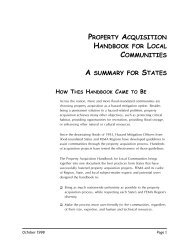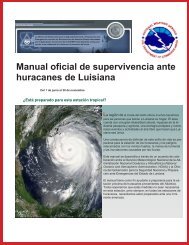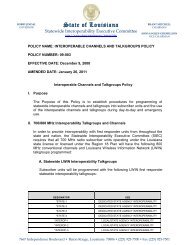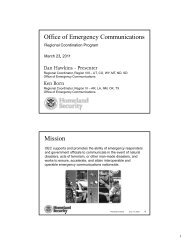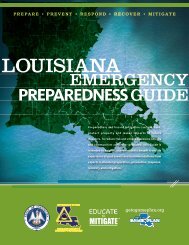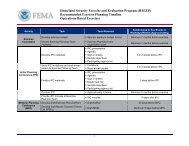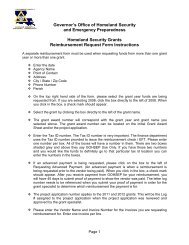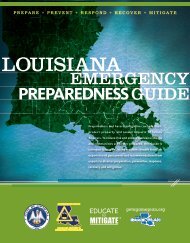Before the Federal Communications Commission Washington, D.C. ...
Before the Federal Communications Commission Washington, D.C. ...
Before the Federal Communications Commission Washington, D.C. ...
- No tags were found...
You also want an ePaper? Increase the reach of your titles
YUMPU automatically turns print PDFs into web optimized ePapers that Google loves.
<strong>Federal</strong> <strong>Communications</strong> <strong>Commission</strong> FCC 02-64programming of <strong>the</strong>ir lead or hub station. 145 The Public Broadcasters note that under <strong>the</strong> old EBS rules,<strong>the</strong> <strong>Commission</strong> permitted licensees of broadcast station transmitters located at different geographicpoints but programmed from a common studio point to use only one set of EBS equipment upon ashowing that one set of equipment could meet <strong>the</strong> requirements and intent of <strong>the</strong> EBS rules. 146 The<strong>Commission</strong> staff has granted permanent waivers of <strong>the</strong> requirement to install EAS equipment forsatellite/repeater stations that rebroadcast 100% of <strong>the</strong> programming of <strong>the</strong>ir hub station and are locatedin <strong>the</strong> same local EAS area as <strong>the</strong> hub station, but has granted only temporary waivers where <strong>the</strong>satellite/repeater stations are outside <strong>the</strong> hub station’s local EAS area. 147 The Public Broadcasters arguethat <strong>the</strong>se temporary waivers should be made permanent because <strong>the</strong>y can comply with <strong>the</strong> requirementsand intent of <strong>the</strong> EAS rules without incurring <strong>the</strong> additional costs and burdens of installing EASequipment at each of <strong>the</strong> satellite/repeater stations. The Public Broadcasters assert that satellite/repeaterstations which simulcast 100% of <strong>the</strong>ir hub station’s programming comply with <strong>the</strong> requirement thatbroadcast stations participate in national EAS alerts because national EAS alerts carried by a hub stationare automatically retransmitted over <strong>the</strong> satellite/repeater stations. They fur<strong>the</strong>r assert that <strong>the</strong>y shouldnot be required to install EAS equipment at each of <strong>the</strong> satellite/repeater locations for <strong>the</strong> sole purpose oftransmitting state and local EAS alerts because participation in state and local EAS activities is voluntaryunder <strong>the</strong> EAS rules. None of <strong>the</strong> commenters addressed <strong>the</strong> Public Broadcasters’ waiver request.67. We will amend <strong>the</strong> Part 11 rules to exempt satellite/repeater stations which rebroadcast100% of <strong>the</strong> programming of <strong>the</strong>ir hub station from <strong>the</strong> requirement to install EAS equipment.Specifically, we will consider <strong>the</strong> use of a single set of EAS equipment at a hub station (or commonstudio/control point where <strong>the</strong>re is no hub station) to satisfy <strong>the</strong> EAS obligations of <strong>the</strong> satellite/repeaterstations which rebroadcast 100% of <strong>the</strong> hub station’s programming. This exemption will apply toexisting satellite/repeater stations and any proposed new satellite/repeater stations. As <strong>the</strong> PublicBroadcasters point out, <strong>the</strong> satellite/repeater stations will comply with <strong>the</strong> requirement to transmit allnational EAS alerts because all national alerts will be passed through from <strong>the</strong> hub station. In addition,we acknowledge that it may be unnecessarily burdensome for <strong>the</strong> governmental and educationalinstitutions operating <strong>the</strong>se satellite/repeater stations to incur <strong>the</strong> substantial cost of installing EASequipment at each such satellite/repeater station for <strong>the</strong> sole purpose of being able to transmit state andlocal EAS alerts, which are voluntary under our rules. Fur<strong>the</strong>rmore, only a small number of broadcaststations will be eligible for this exemption. 148 We emphasize, however, that if any of <strong>the</strong>satellite/repeater stations start originating any of <strong>the</strong>ir own programming, <strong>the</strong>y will be required to installEAS equipment. Finally, we note that some models of EAS equipment have <strong>the</strong> capability to monitor <strong>the</strong>assigned EAS sources for more than one local EAS area, i.e., a hub station may have <strong>the</strong> capability to145Public Broadcasters Comments at 4-8.146Public Broadcasters Comments at 3 (citing Louisiana Association of Broadcasters, 57 FCC 2d 648, 651(1976)).147On February 16, 2001, <strong>the</strong> Public Broadcasters filed a joint request for a permanent waiver of <strong>the</strong>requirement to install EAS equipment for certain satellite/repeater stations which rebroadcast 100% of <strong>the</strong>ir hubstation’s programming. By letter dated April 19, 2001, <strong>the</strong> <strong>Commission</strong> staff denied this request, stating that changesof this magnitude are best addressed in a rulemaking proceeding so that all interested parties may have <strong>the</strong>opportunity to comment. Letter from Joseph P. Casey, Chief, Technical and Public Safety Division, EnforcementBureau, <strong>Federal</strong> <strong>Communications</strong> <strong>Commission</strong>, to Christine J. Newcomb, Dow, Lohnes & Albertson (April 19,2001).148<strong>Commission</strong> records indicate that <strong>the</strong>re are approximately 100 satellite/repeater stations which currentlyhave temporary waivers of <strong>the</strong> EAS rules and thus would be eligible for <strong>the</strong> exemption.26




